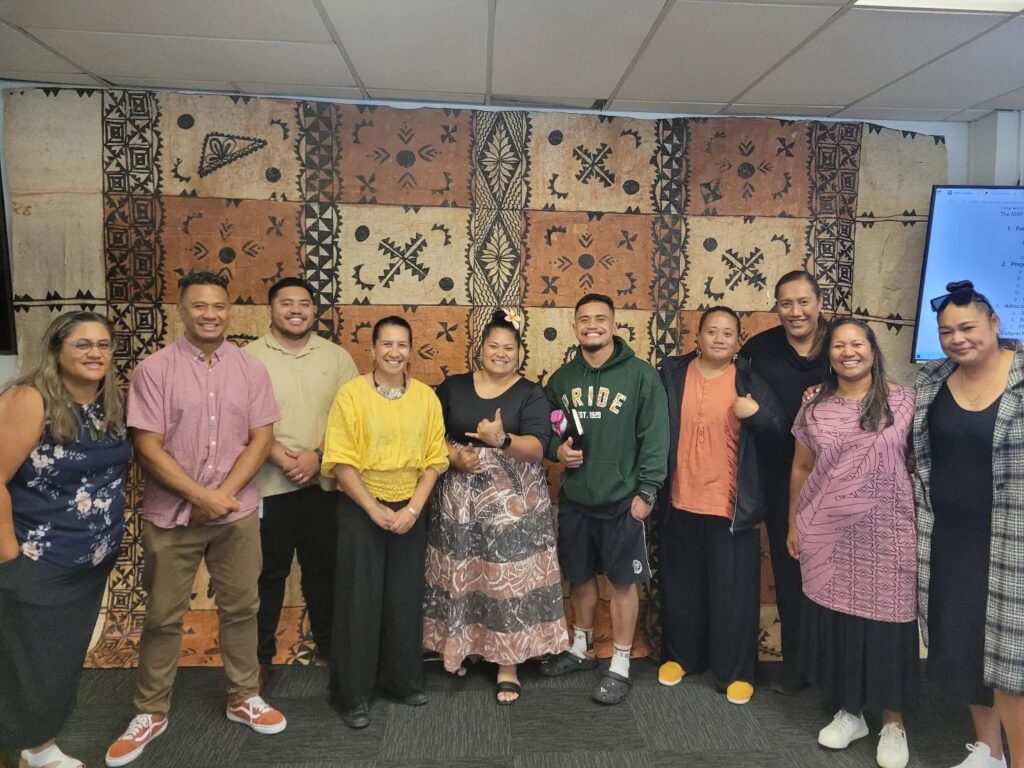
Above: The Move Auckland Pasifika Collective (MAP) with Hawaiki Hou, and our Movement and Sport team.
Having a strong desire to achieve a common goal is what sets a great vision in motion. In fact, it’s an act of service, commitment and collective energy towards bringing the vision to life. The vision of supporting Māori and Pasifika communities to live healthier lives to participate in recreational activities that is inclusive of their language, culture, traditional knowledge, indigenous systems, and faith.
When the Move Auckland Pasifika Collective (MAP) formed in October 2020, this is the vision they had in mind.
The MAP Collective is a collective of Māori and Pacific activators determined to help provide pathways for Māori and Pasifika communities in South Auckland to access affordable, and enjoyable opportunities for play and movement as well as mental health workshops. Moreover, the collective seeks opportunities for capability building to support the financial and socio-economic growth of small businesses’. Participation, trust, social cohesion and reciprocity is nurtured as a result.
Currently, the MAP Collective consist of the following organisations:
The team deliver their services through in person activations as well as utilising digital platforms to host talanoa sessions, and exercise workshops to foster whakawhanaungatanga and manaaki in their respective communities.
The Cause Collective jumped on board to backbone the MAP collective in supporting communities to access equitable opportunities to participate in physical activity, sport, recreation, and play.
According to survey data released in 2020/2021 by the Ministry of Health, ‘the prevalence of obesity among adults differed by ethnicity, with 71.3% of Pacific, and 50.8% of Māori.’ The statistics showed the same alarming rates with ‘71.3% for Pacific and 50.8% for Māori.’ The data also highlighted that adults and children living in low socio-economic areas were most likely be obese compared to those not living in socially deprived areas.
Regarding long-term chronic conditions, ‘the prevalence of long-term conditions is high and rising, particularly for Māori and Pacific people who experience the onset of disease at a younger age and face a higher risk of complications and early death.’
To help combat these statistics, the MAP Collective decided on using a cultural framework guided by Māori and Pacific principles to support effective social change, and build genuine relationships with community engagement. To help their mahi with Māori communities, the team utilise Te Whatu Ora’s Rehua framework, and the Kakala Research Framework to guide their research and methodology practices.
“The statistics show a stark reality, and this can be discouraging for our communities. As a Māori and Pacific collective, the team are equipped as cultural knowledge holders to create authentic relationships with the communities they serve.
As a result, they can strategize best practices to bring out the confidence in our community to participate in movement and recreational activities that interest them,” says Pita Alatini, Lead Systems Innovator.
The current national sports policy and the Auckland plan omit Māori and Pacific worldviews on health and wellbeing. In reality, Māori and Pacific people are typically squeezed into mainstream, one-size-fits-all public programs, that seek to entice people to participate in physical activity programs that are geared towards the general population. Due to this, the sector favours competitive and high-earning sporting activities thus creating information gaps, preventing equitable opportunities for our communities.
Romero Tagi, 31, co-founder of Pop Up Play, laments that changing the perceptions of movement and play is crucial to overturning the current system and policies in play.
“Pop Up Play encourages intergenerational play so that everyone from our tamariki to our elders are enjoying movement. It’s a way to bring family and friends together to connect and socialise whilst being physically active. It’s about extending our reach into the community to know their needs and how they want to move,’ says Romero.
Motivated by these ideals, the MAP Collective pulled together its resources, talents, and cooperation to apply for funding from Sports NZ. They desired to advocate on behalf of our communities and its needs to governing organisations, and hold them accountable.
By amplifying our community perspectives, lived experiences and needs, the collective hopes it challenges these governing bodies to reimagine what recreation and movement looks like when Māori and Pacific perspectives are included in the decision-making process.
Once the application process was completed and submitted, it was a waiting game. In the meantime, the team went about their kaupapa, business-as-usual.
References:
Ministry of Health, (2021, 21 December), Obesity Statistics Link: https://www.health.govt.nz/nz-health-statistics/health-statistics-and-data-sets/obesity-statistics#:~:text=there%20was%20a%20significant%20increase,18.5%25%20of%20Asian%20adults%20obese.
Hogan S, Song Z. 2022. The Cost of Long-term Conditions in New Zealand: Review of the evidence – 2021 update. Wellington: New Zealand Institute of Economic Research.